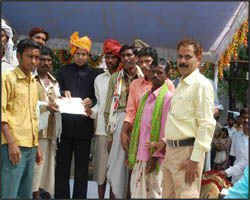 An Indian poultry breed, Kadaknath is native to Jhabua district of Madhya Pradesh. Kadaknath is famous for its black meat which is known for its meat quality, texture and flavour. This species is known to bear special medicinal value in homeopathy and a particular nervous disorder. This poultry reared mainly by the tribal community of Bhil and Bhilala in the districts Jhabua and Dhar in Madhya Pradesh. Due to its meat alleged medicinal prosperities, this is high demand and high price bird. During the R & D activities by the scientists of Krishi Vigyan Kendra, Jhabua, it was observed that the population of this bird is declining rapidly and it is under threat of extinction and genetic erosion. An attempt was therefore made for conservation and promotion of this high value Indian poultry race under National Agriculture Innovation Project Component- 3 sub project entitled, “Integrated farming system for sustainable rural lively in undulating and rainfed areas of Jhabua and Dhar districts of Madhya Pradesh”.
An Indian poultry breed, Kadaknath is native to Jhabua district of Madhya Pradesh. Kadaknath is famous for its black meat which is known for its meat quality, texture and flavour. This species is known to bear special medicinal value in homeopathy and a particular nervous disorder. This poultry reared mainly by the tribal community of Bhil and Bhilala in the districts Jhabua and Dhar in Madhya Pradesh. Due to its meat alleged medicinal prosperities, this is high demand and high price bird. During the R & D activities by the scientists of Krishi Vigyan Kendra, Jhabua, it was observed that the population of this bird is declining rapidly and it is under threat of extinction and genetic erosion. An attempt was therefore made for conservation and promotion of this high value Indian poultry race under National Agriculture Innovation Project Component- 3 sub project entitled, “Integrated farming system for sustainable rural lively in undulating and rainfed areas of Jhabua and Dhar districts of Madhya Pradesh”.
During interaction with farmers of Jhayda cluster, Jhabua, it was observed that high market demand, existence of backyard poultry system of its rearing, slow growth on natural feeding (186 days sexual maturity) and more than 50 % mortality before maturity are major factors which affect the survival, growth and productivity of this breed. Accordingly, the intervention made in the NAIP project was construction of low cost poultry shed, trainings on advanced technologies of poultry production, optimum feed and balance diet, vaccination for protection from diseases and exploring the marketing avenues. Ten tribal farmers namely, Shri Pansingh, Humji, Babu, Ramesh, Nansingh,Jhitara, and Udisingh of village Jhayda and Shri Methiya, Leelsingh and Magaliya of village Neghadiya of cluster Jhayda were selected for this programme. One hundred poultry chicks of ten days old were made available to each beneficiary. The farmers were advocated on technologies for scientific poultry production, balance feeding, handling of feeder and drinkers, health management and marketing. Timely vaccination was also carried out for the control of ranikhet (F1/B1, lasota and R2B) and gumboro diseases. Deworming was performed at 55 days age. Now the beneficiaries have been trained in managing the production of Kadaknath in better way. They are using low cost poultry feed comprising of grain, bran, cake calcite, salt, minerals and vitamins etc for 2500 cal/kg with protein ( 16%), calcium (1%) and phosphorus (0.4%).

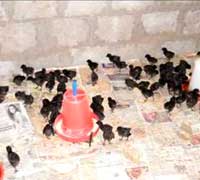
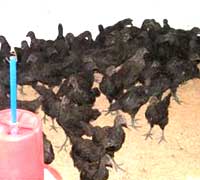
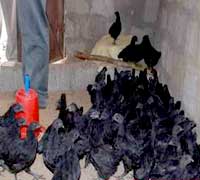
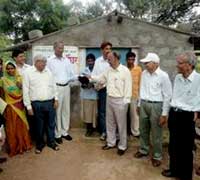
This new Kadaknath production technology has reduced the mortality rate from greater than 50% to 10-12% and thus enhanced the survival percentage. The bird is gaining the body weight in faster way and attaining saleable weight of 1.10 kg in 105-120 days. The producers are selling this body weight poultry @ Rs 300 to 350/kg body weight. In this way, an individual beneficiary is gating the net income of Rs 90 to 105 thousands /beneficiary/ year. The tribal farmers are very happy with this intervention and increasing the number of low cost poultry sheds. It is also helpful in reducing the job oriented migration as many of the farmers are starting this poultry farming units in disadvantaged district Jhabua, Madhya Pradesh.
This sustainable system of livelihood through Kadaknath rearing has well recognized by the district administration of Jhabua. The Kadaknath Murgi Palan Samooh, Jhayda has been awarded by a certificate of appreciation
with a cash prize of Rs 20,000/- on the occasion of Independence Day i.e. August 15, 2010 by district administration, Jhabua for excellent work on Kadaknath rearing.
(Source:Directorate of Research Services, Rajmata Vijayaraje Scindia Krishi Vishwa Vidyalaya, Gwalior. Email: drsrvskvv@rediffmail.com)








Like on Facebook
Subscribe on Youtube
Follow on X X
Like on instagram